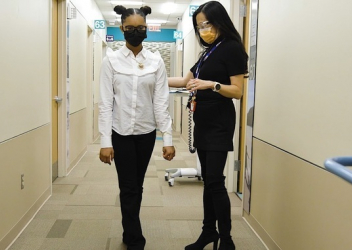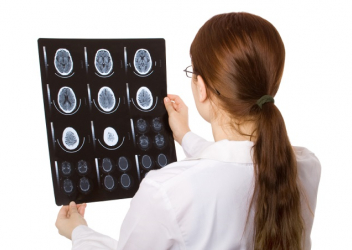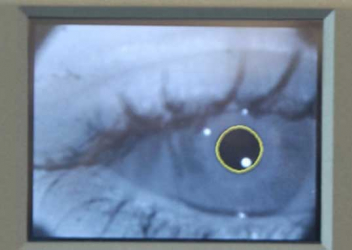Objective Measures For Concussion
The Minds Matter Concussion research team has been pursuing a comprehensive translational research approach to phenotype concussion with clinical and objective measures. This work aims to provide concussion biomarkers for diagnostics, monitoring, evaluating therapeutics, and prevention.
Research Projects
- Maximizing Concussion Diagnosis AccuracyMore
Multiple clinical evaluation tools exist for adolescent concussion, and clinicians face challenges in identifying which tool elements provide the greatest diagnostic utility. With a goal to streamline the comprehensive concussion assessment, this study evaluated the combination of elements from four commonly used clinical evaluation tools that maximized discrimination between concussed and non-concussed patients. Individual elements of the four clinical evaluation tools that measure symptoms, attention, balance, and the visio-vestibular system were evaluated among 166 non-concussed and 231 concussed adolescents. A grouping of 4 factors: Visio-vestibular examination (VVE) saccades and vestibulo-ocular reflex; the double leg stance of the modified balance error scoring system; Symptom score from the Sport Concussion Assessment Tool and Postconcussion Symptom Inventory; and King-Devick test completion time emerged as top discriminating factors. While current diagnostic tools likely measure overlapping domains, these findings demonstrate strategies for streamlining a comprehensive assessment.
- Identifying Links between Concussion and Mitochondrial Disease Provides Insight to TreatmentMore
The Minds Matter Concussion Program is collaborating with a range of CHOP experts on a Mitochondrial Medicine Program study. This project aims to study the link between bioenergetics (a field of biochemistry that focuses on how cells transform energy) and autonomic nervous system dysfunction seen in concussion. Minds Matter researchers are deploying pupillometry, exercise testing, and cerebral oxygenation measurement via functional near-infrared spectroscopy (fNIRS) to study this relationship in concussed youth and those with primary mitochondrial disease. Our work supports the overall study goal to develop quantitative biomarkers and objective outcome measures that measure bioenergetic dysfunction and provide insight into paths of treatment for both conditions. The goal of this cross-CHOP team is to develop tools to monitor outcomes from therapeutic interventions in patients with primary mitochondrial disease as well as secondary mitochondrial disruption, such as is seen in concussion.
Principal Investigators: Marni Falk, MD, Co-Investigators: Kristy Arbogast, PhD Christina L Master, MD, CAQSM, Daniel Corwin, MD, MSCE
Funding: United States Department of Defense
- Visio-Vestibular Markers for ConcussionMore
There is significant evidence that concussion can alter the visual and vestibular systems. Over a series of research publications, researchers describe these deficits seen in clinical settings and their association with prolonged recovery from concussion. The Minds Matter Concussion team has been testing tools, such as visio-vestibular clinical exams and new technologies, to objectively measure these deficits.
- Genomic Markers for Concussion
Understanding what populations of children may be at increased risk for concussion, or may be more likely to have prolonged recovery, could allow for more targeted interventions that may help further reduce concussion incidence and severity. The primary aim of this project is to determine if variations in the human genome are associated with concussion incidence and/or outcomes-- specifically, the association between genomic variation and phenotypic outcomes in a cohort of patients prospectively identified with new concussion. In collaboration with CHOP’s Center for Applied Genomics (CAG) we are conducting a retrospective analysis on kids who have had genetic testing conducted as part of another study at CHOP and have a concussion diagnosis. We are also evaluating the feasibility and logistics of prospectively collecting this genetic information at the time of concussion diagnosis.
Principal Investigators: Kristy Arbogast, PhD, Christina Master, MD, Hakon Hakonarson, MD, PhD
Funding: Children's Hospital of Philadelphia
- Pennsylvania Consortium on TBI (PACT)
A collaboration between the Minds Matter Concussion Program, the Penn Center for Brain Injury and Repair, the University of Pittsburgh and Moss Rehabilitation Research Institute, this study aims to improve diagnosis, management and treatment of TBI using techniques that can be utilized to identify neuropathologically and neurophysiologically relevant brain changes after traumatic brain injury (TBI) from mild to severe. Team members from CHOP aim to determine the utility of serum blood biomarkers in establishing a diagnosis for concussion. In particular, the role and extent of diffuse axonal injury in concussion outcomes are being examined, with hopes of being able to link those findings to persisting neurocognitive defection following concussion.
Principal Investigator: Douglas H. Smith, MD; Co-Investigators: Christina L. Master, MD, Kristy Arbogast, PhD
Funding: Pennsylvania Department of Health
- Select Objective Measures of Concussion Review Papers
Fluid Biomarkers of Pediatric Mild Traumatic Brain Injury: A Systematic Review
This systematic review confirms the existing research on fluid biomarkers and emphasizes the need for longitudinal studies to better characterize the utility of fluid biomarkers for mTBI patients.
Advanced Biomarkers of Pediatric Mild Traumatic Brain Injury: Progress and Perils
In this review of studies on biomarkers for predicting which patients will struggle to recover from pediatric mTBI, authors found few high-quality, clinically impactful of diagnostic or prognostic biomarker studies in the sub-acute injury phase. Well-powered longitudinal studies with appropriate control groups, as well as standardized and clearly-defined inclusion criteria, are needed to understand the complex pathophysiology that may underlie post-concussive symptoms.
- Completed and Foundational Projects
Quantitative Assessments for Sports-Related Concussion
This five-year project integrates neuroscience, bioengineering and clinical protocols involving instrumenting athletes on the field, using animal models in the laboratory and in-depth clinical observation of patients with concussion with a goal to develop a suite of quantitative assessment tools to enhance accuracy of sports-related concussion diagnoses, with a focus on objective metrics of activity, balance, neurosensory processing including eye tracking, as well as measures of cerebral blood flow. A particular interest in this project is examining sex-specific data to see how prevention and diagnosis strategies need to be tailored differently for males and females.
Integrative Science to Advance Pediatric Concussion Diagnosis and Treatment
This project aims to increase our knowledge of the neurological health effects of repeated head impacts for middle school and high school-age youth involved in sports through the use of head impact sensors and a diverse suite of neurofunctional assessments, develop an objective biofluid biomarker to identify the functional deficits associated with youth concussion, advance our basic science understanding of the electrophysiology of concussion and, lastly, examine changes in neural brain activity using novel methods of magnetoencephalography (MEG).
Principal Investigator: Kristy Arbogast, PhD; Co-Investigators: Christina Master, MD, Akiva Cohen, PhD, J. Christopher Edgar, PhD, Catherine McDonald, PhD, Gary Beauchamp, PhD
Funding: Pennsylvania Department of Health
Traumatic Brain Injury Diminishes Feedforward Activation of Parvalbumin-expressing Interneurons in the Dentate Gyrus
This study investigated the underlying mechanism(s) that contribute to previous reported increases in network activity in a subregion of the hippocampus known as the dentate gyrus. Network activity is controlled by the delicate balance between the “Go” system mediated by the excitatory neurotransmitter glutamate and the “STOP” system mediated by the inhibitory neurotransmitter GABA. Here we demonstrate that mild traumatic brain injury (TBI) leads to alterations in excitatory (glutamate) and inhibitory (GABA) afferent input onto the principal neurons in dentate gyrus. Furthermore, an overall decrease in GABA mediated transmission by specific parvalbumin (a calcium-binding protein) containing inhibitory neurons in the dentate gyrus is due in part to too much GABA being released onto these neurons a process known as disinhibition.














